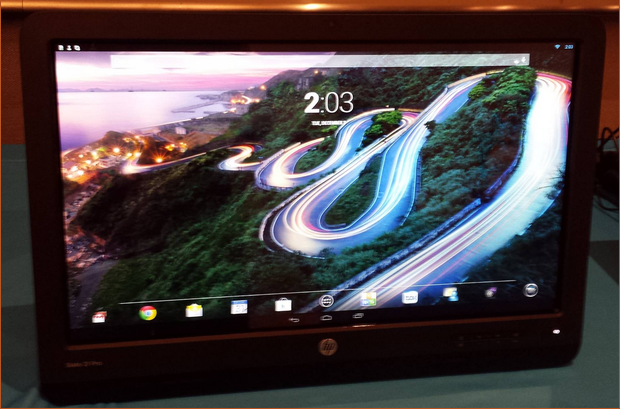Microsoft has a killer advantage against Android on the desktop


Now that CES is in full-flow, we know that Lenovo is pitching an Android PC desktop, and HP are pitching a whole bunch of different Android PC form factors including all-in-ones, a minitower, a detchable screen hybrid, and a traditional laptop.
My ZDNet colleague Steven J Vaughn-Nichols wrote a piece about whether an Android desktop could replace your Windows PC.
I'm sure it could, but the question is whether anyone will bother when buying a Windows PC for roughly the same amount of money.
Utility
About a year ago, I bought a Chromebook. Spoiler: I really liked it. The genius about a Chromebook is its simplicity. If you just want a screen and a keyboard for getting online and getting stuff done, Chromebooks have an awful lot going for them.
I'm regarded as being something of a techie geeky-type person, but I don't have much computer kit. I have one laptop, one tablet, and one smartphone. (OK, so I have a bunch of other kit that I used for testing when I'm undertaking client work, but the day-to-day stuff I use, I have one device of each type.)
CES 2015 Preview
The reason why I have one of each rather than a complex menagerie of devices to fiddle with is that I don't really like messing around with technology that much. I like it to work, and I like to be simple. With the Chromebook, although I really liked it, I got rid of it because I never switched the thing on. If I needed a device with a keyboard, I'd use my full laptop because the Chromebook would only ever do a subset of things that my laptop would do.
One experiment I did try with my Chromebook was to use it to remote desktop into a server in the cloud that had a full Windows virtual machine on it. This VM had my development environment and all the other tools on it that wouldn't run on the Chromebook. It didn't work very well -- principally because the user experience provided was too slow and laggy.
I could have reengineered my entire life to accommodate both a Chromebook and my full laptop but -- well, I'd have to seriously ask myself "why?"
The point of all of this is that on one hand we have something that out of the box works really well and is minimal hassle (the full laptop), and the other hand we have something that I had to faff around with and make work (the Chromebook).
Advantage
Android PCs are always going to suffer in that whatever you do with them, you're always going to be "cutting against the grain", compared to Windows. Every little effort you make to do something a little bit outside of the expected use cases will be ten times harder on Android.
This "hassle factor" is Microsoft's big advantage when we look at market pressures from post-PC operating systems trying to encroach into the PC universe. Windows is a phenomenally good PC operating system. Android, and Chrome OS, are great post-PC operating systems, but poor PC operating systems.
There are four different types of people who will try to use Android as a desktop operating system to replace Windows, or OS X.
The first sort will be technologists who want to realise some vision. They have a deep understanding of PCs and are willing to tinker with an Android PC to make it work in a way that, to them, seems cool. (I'm not trying to be derogatory towards technologists here -- I fully intend to buy an Android PC to experience it firsthand and I'm sure I'll enjoy doing so.)
The second sort will be friends and families of technologists whom the technologist has convinced that an Android PC is a better bet than a Windows PC for whatever reason. As my ZDNet colleague James Kendrick has written before,post-PC devices can work really well for simplifying the IT that less-technical family members have to deal with.
The third sort will be people who don't know what they're buying, and will buy an Android PC without knowing what they're getting into.
The fourth sort will be IT managers who believe deploying Android PCs will yield some advantage over an equivalent deployment of Windows PCs.
At this point, I'm not convinced there's a strong "winning" story in any of these four camps. Technologists tend to enjoy projects even if they are ultimately successful or not (because playing with technology is always cool). For the friends and family, it might work OK, but whoever is driving that project will have to be prepared for that unavoidable "How do I install Photoshop on this?" type call. For the accidental buyer, it's never going to go well. And for the IT manager -- it could go either way depending on their objectives.
Featured
But if you look at Windows, whatever you're looking to do always works.
Conclusion
For the majority of normal customers in the market, there is no "PC market", there is a "Windows market". If it looks like a PC -- and those Android PCs from Lenovo and HP sure do look like PCs -- any customer expectation is going to be that they are equivalent to, and behave like Windows PCs.
But they won't behave as such. As such, feel free to either expect them not to sell, or to sell and have extremely high rates of return.
What do you think? Post a comment, or talk to me on Twitter: @mbrit.